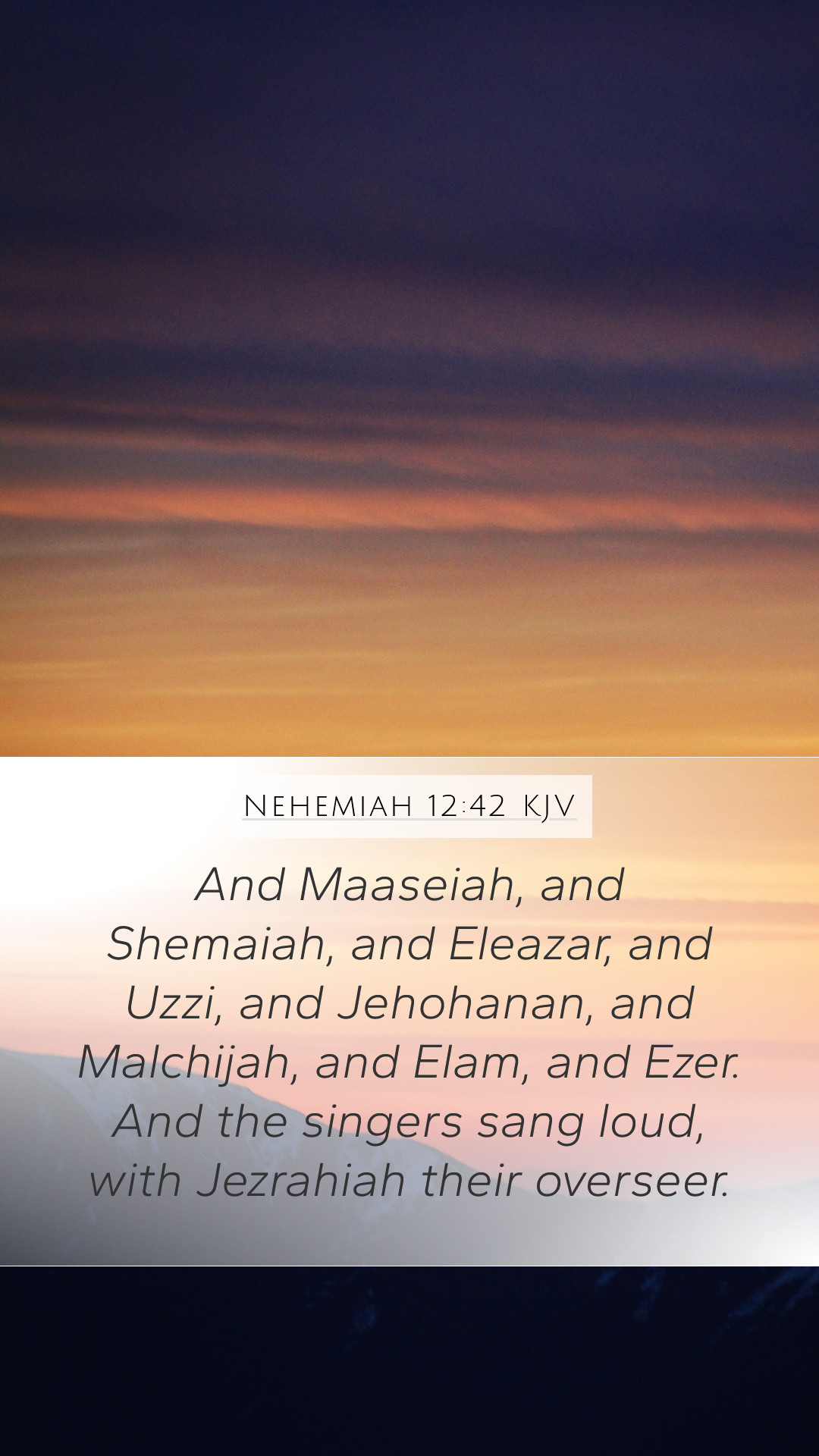Understanding Nehemiah 12:42
Nehemiah 12:42 provides a vivid portrayal of the dedication ceremony for the wall of Jerusalem and emphasizes the importance of worship and reverence to God during this significant event. This verse states:
"And the singers sang loudly, with Jezrahiah their director. Also that day they offered great sacrifices and rejoiced, for God had made them rejoice with great joy; the women and children also rejoiced, so that the joy of Jerusalem was heard afar off."
Bible Verse Meanings and Interpretations
This verse highlights several key themes that are crucial for understanding its broader implications:
- The Role of Worship: The singing led by Jezrahiah signifies the central role of worship in celebrating God’s faithfulness. Worship is not just a ritual; it is an expression of gratitude and community.
- Expressions of Joy: The joy experienced by the people reflects the happiness that follows divine intervention. In biblical terms, joy is a direct response to God’s acts of salvation and restoration.
- Inclusion of All People: The mention of women and children partaking in the rejoicing indicates that the covenant community is inclusive, emphasizing that everyone, regardless of age or gender, is an integral part of worship and celebration.
- Corporate Celebration: The great sacrifices offered during the ceremony symbolize the communal aspect of worship, strengthening community ties through shared faith and practices.
- What It Means to Rejoice: The phrase "the joy of Jerusalem" signifies the collective identity of the people who are reconciled and restored, showing that their joy is not only personal but communal.
Bible Verse Commentaries
Matthew Henry's Commentary
Matthew Henry emphasizes the significance of joyful obedience to God's commandments during the dedication. He notes that music and singing during the celebration reflect the heart of God's people who respond to His blessings with worship. The unity among the people, as they rejoiced together, reflects their collective commitment to rebuilding their relationship with God.
Albert Barnes' Commentary
Albert Barnes expands upon the communal and joyous atmosphere described in Nehemiah 12:42. He highlights that such a public display of joy was not only an occasion to thank God but also served to encourage others in their faith journey. The involvement of families and children serves as a model for future generations, teaching them the importance of celebrating God’s works.
Adam Clarke's Commentary
Adam Clarke notes that the role of the singers underlines a noteworthy aspect of worship in ancient Israel. He stresses that music has a unique ability to elevate the spirit and express the inexpressible—our deepest emotions towards God. Clarke also points out that the specific mention of great sacrifices signifies the acknowledgment of God’s blessings, and these acts of worship were foundational in the life of the community.
Historical Context of Nehemiah 12:42
For a deeper understanding, one must consider the historical background of this verse:
- Nehemiah's leadership during the reconstruction of Jerusalem's wall following the Babylonian exile represents hope and renewal for a people once devastated by sin and destruction.
- The people’s response to the completion of the wall is characterized by joyful gratitude and public worship, indicating their awareness of God’s sovereignty and favor.
- The celebration is emblematic of a return to covenant faithfulness, where the restoration of the city also represents the restoration of their spiritual lives.
Application of Nehemiah 12:42 in Daily Life
This scripture can be applied to contemporary life in several ways:
- Promote a culture of gratitude within your community or family, acknowledging the blessings that have been received and celebrating them together.
- Embrace the joy of worship in your daily life, finding creative ways to express joy through music, singing, or communal activities centered on faith.
- Encourage participation in worship activities for all ages, recognizing that faith is a shared journey and joy should be expressed collectively.
Cross References
Nehemiah 12:42 can be related to several other scripture passages:
- Psalm 30:5: "For his anger is but for a moment, and his favor is for a lifetime. Weeping may endure for a night, but joy comes in the morning."
- Isaiah 12:3: "With joy you will draw water from the wells of salvation."
- 1 Chronicles 15:16: "David spoke to the leaders of the Levites to appoint their brothers as singers, who should play loudly on musical instruments, on harps and lyres... "
Conclusion
The profound insights gleaned from Nehemiah 12:42 encompass themes of joy, community, and worship that are timeless and resonate across generations. Through biblical exegesis, one can appreciate this passage as a reminder of the importance of gratitude and celebration in our spiritual lives, urging communities today to maintain a collective spirit of joy and worship in response to God's blessings.


